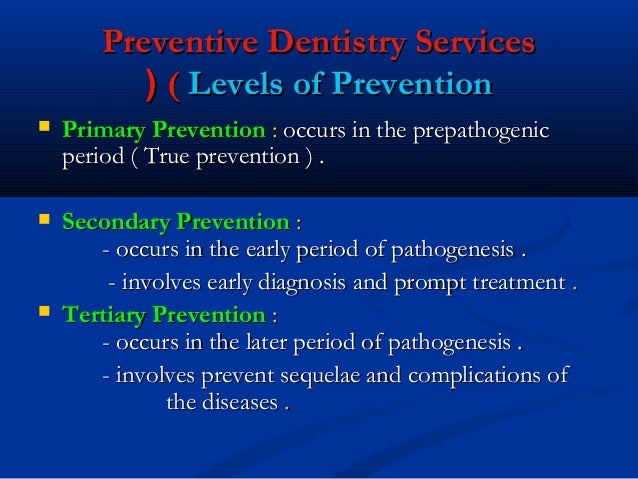Preventive Dentistry

Preventive dentistry is key to keeping your teeth healthy throughout the course of your life. But it goes beyond that. Good oral health can impact your general health, as well.
Preventive dentistry emphasizes the importance of ongoing hygiene procedures and daily practices to prevent tooth decay and other dental diseases and conditions.
Effective preventive dentistry combines at-home oral care by patients with chairside treatments and counseling by dental professionals. Both natural teeth and teeth with restorations survive best in an oral environment that is clean and where the intake of harmful foods is controlled.
Begin daily tooth cleaning as soon as your child’s first tooth erupts. Visit a pediatric dentist when the first tooth erupts, or no later than 12 months of age, to establish a comprehensive oral health prevention program for your child.
What’s your role in preventive dental care:
Much of your preventive dental care starts with you. Developing healthy dental habits early in life can help reduce cavities, gum disease, and gingivitis. Here are the basics of good oral health:
- Brush your teeth at least 2 times a day—usually morning and night–using a soft-bristled brush and a fluoride toothpaste. Your dentist can recommend the best toothbrush and toothpaste for you. They can also instruct you on how to properly brush.
- Floss daily to get food that’s stuck between teeth before it turns to plaque.
- Use a mouthwash to rinse out food particles after flossing.
- Avoid acidic foods that can harm tooth enamel.
- Be cautious with hard foods, like some candies, foods with bones, seeds, or pits that could damage or chip teeth.
- Don’t smoke or use tobacco products–these can lead to cancer and other dental problems.
- Use a mouthguard when participating in certain sports.
- If you grind your teeth at night, ask your dentist for a nighttime mouth guard to help reduce gum recession.
What is preventive dentistry for children:
As soon as a child gets their first tooth, preventive dental care can begin. Preventive dentistry for kids can help identify problems early on in your child’s life before dental problems become worse and often more costly. Services typically include the following:
- Promote good dental habits, including brushing and flossing, guidance on thumb sucking, as well as advice on eating habits that help improve dental health.
- Regular teeth cleanings and oral exams, usually every 6 months
- Fluoride application (usually up to a certain age)
- Sealants
- Routine X-rays to help track jaw and teeth development
- Fitting athletic mouth guards
- Referrals to orthodontists if teeth are crooked
- Referrals to other dental specialists as needed
- Helping identify related health issues that may impact a child’s dental health
Can everybody benefit from preventive dentistry:
Yes. Preventive dentistry will benefit anyone with some of their own teeth. People who don’t have any teeth can also benefit because conditions such as mouth cancer and denture stomatitis can be spotted during regular visits to the dental team and then treated. It is excellent for children and young people, but it is never too late to start.
What is involved:
Our dental team will first check your teeth and gums, and talk to you about any treatment you need. The main aim is to help you get your mouth really healthy. In a healthy mouth, it is unlikely that decay or gum disease will continue to be a problem.
- We will thoroughly remove all plaque and tartar from your teeth. This is often called a ‘scale and polish’.
- We will show you the best ways to brush, and how to clean in between your teeth using interdental brushes or floss, to remove the bacterial ‘plaque’ which forms constantly on your teeth.
- When you eat or drink something sugary, the bacteria in the plaque turn the sugar into acid, which may cause tooth decay.
- Plaque can also cause gum inflammation (swelling and soreness) if it is not regularly and thoroughly removed. The hard tartar (or ‘calculus’) which builds upon the teeth also starts off as plaque.
- You will be told which oral care products are the best ones for you to use.
- The dental team will probably talk to you about your diet and any habits you have such as smoking and drinking.
- Your dentist will also make sure that all your fillings are in good condition and that there are no rough edges to make cleaning difficult.